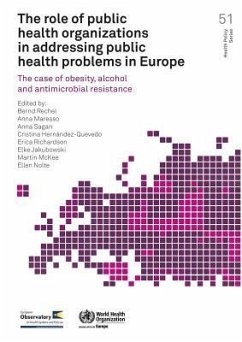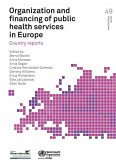Growing levels of obesity (including among children), continued harmful consumption of alcohol, and the growing threat of antimicrobial resistance (AMR) are some of the greatest contemporary challenges to the health of European populations. While their magnitude varies from country to country, all are looking for policy options to contain these threats to population health. It is clear that public health organizations must play a part in any response, and that intersectoral action beyond the health system is needed. What is less clear, however, is what role public health organizations currently play in addressing these problems. This is the gap that this volume aims to fill. It is based on detailed country reports from nine European countries (England, France, Germany, Italy, the Republic of Moldova, the Netherlands, Poland, Slovenia and Sweden) on the involvement of public health organizations in addressing obesity, alcohol and antimicrobial resistance. These reports explore the power and influence of public health organizations vis-a-vis other key actors in each of the stages of the policy cycle (problem identification and issue recognition, policy formulation, decision-making, implementation, and monitoring and evaluation). A cross-country comparison assesses the involvement of public health organizations in the nine countries covered. It outlines the scale of the problem, describes the policy responses, and explores the role of public health organizations in addressing these three public health challenges. This study is the result of close collaboration between the European Observatory on Health Systems and Policies and the WHO Regional Office for Europe, Division of Health Systems and Public Health. It accompanies two other Observatory publications: Organization and financing of public health services in Europe and Organization and financing of public health services in Europe: country reports.
Hinweis: Dieser Artikel kann nur an eine deutsche Lieferadresse ausgeliefert werden.
Hinweis: Dieser Artikel kann nur an eine deutsche Lieferadresse ausgeliefert werden.







